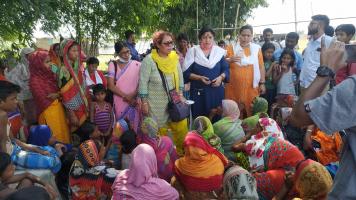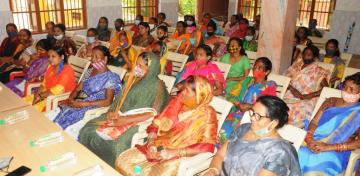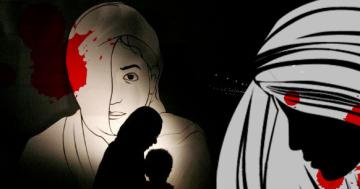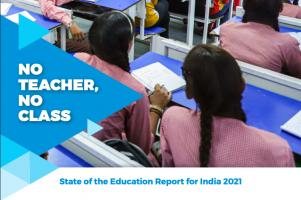In a country where the alarming spike in rape incidents are giving a lie to the “acche din” claim of the BJP Government, the Asifa rape case has touched a new low.
In a country where the alarming spike in rape incidents are giving a lie to the “acche din” claim of the BJP Government, the Asifa rape case has touched a new low. Not just because of the horrendous nature of the planned gang rape and murder of an 8 year old child within the precincts of a temple, but also because the Hindutva clan got the local community mobilized in favour of the accused. Malice was spewed out against the victim who belonged to the extremely backward nomadic Bakhrewal community, known as migrant shepherds of sheep and cattle. Underlying the communal agenda of the Hindutva brigade was the ulterior motive of depriving these migrants of land to graze their cattle. Lawyers who are mandated to uphold the law resorted to the grossly anti democratic step of refusing legal help to the victim, and threatened to assault the brave woman lawyer who took up the case. The PDP- BJP Government ruling the state which initially looked the other way, finally jumped in with the refrain of amending the law to award capital punishment to child rapists.
Meanwhile, in Unnao district of UP, the local BJP MLA Kuldip Singh Sengar was making a mockery of the law by escaping arrest despite the accusation of rape filed against him by a minor almost a year ago. The father’s unrelenting fight for justice got him killed in police custody – an appalling crime that threw the incident into the spotlight and forced the BJP into a corner. The Adityanath Government maintained hypocritically that the law would take its own course, however, it was only after anti BJP protests started snowballing that charges were framed in accordance with the law and the culprit was arrested.
What reaction came from our honourable prime minister, the prime votary of beti bachao, beti padhao campaign? There is a phrase that captures it chillingly- the silence of the graves. For many days after the incidents hit the national headlines, not a squeak emerged from this noble crusader. Finally, when the heat generated by public opinion against the ghastly crimes could be tolerated no longer, Narendra Modi spoke up against it, assuring swift action to deal with such crimes. And here is what the BJP Government did!
“Off with their heads”
With lightning speed not displayed earlier, the Union cabinet approved the promulgation of the Criminal Law (Amendment) Ordinance,2018, which allows courts to award death penalty to those convicted of raping children below 12 years of age. Before one could say - acche din- the President ratified the ordinance, and lo and behold, the Government had proved how quickly it can act when the need arises!
But was the ordinance really necessary? Did the haste lead to a better law? Will death penalty actually prove to be a deterrent to the sexual predators? No, no, and no. The exhaustive Justice Verma report and recommendations released in the aftermath of the Nirbhaya crime explained its stand categorically : 'In our considered view, taking into account the views expressed on the subject by an overwhelming majority of scholars, leaders of women’s organisations, and other stakeholders, there is a strong submission that the seeking of death penalty would be a regressive step in the field of sentencing and reformation'.”
Its recommendations focussed instead on the major steps to be taken to strengthen the criminal justice system in the country. Many of these are still relevant and need to be implemented in toto. AIDWA has also, after much discussion taken a stance of staunch opposition to the death penalty on principle. This flows from the understanding that retributive punishment under the pretext of dispensing justice cannot be countenanced.
At the same time, it is a fact that courts are already empowered to award death penalty to the accused in a gruesome rape and murder case, as it would fall within the ‘rarest of rare’ category. Even in the Delhi gang rape case, the accused were awarded death penalty under the then existing provisions of the Indian Penal Code, and not under the amended statute.
But for the BJP which wanted to make a populist statement, these and the views of organizations like AIDWA which have been working on the issue for long years were of no import. Many have protested against the knee jerk reaction, pointing out that the ordinance may actually prove to be counterproductive for the victims of rape.
Protesting against the diversionary tactics, AIDWA has strongly insisted on the certainty of punishment, rather than the severity of the punishment. What are the ground realities? The justice system is lagging behind dismally and is in need of multiple reforms. There are severe lacuna in ensuring time bound trials and the conviction rates are very low. Other than the legal aspects, the social paradigm is still highly patriarchal. Adopting long term measures to change existing mind sets is thus another very big challenge that falls beyond the pale of this ordinance. In effect, catching hold of just the trunk of an elephant cannot help to address the magnitude of the problem! The fault lines have to be seen and corrected wherever they are.
Implementing POCSO: where do we stand
Before going into whether death penalty will help matters, let us examine the existing state of affairs. After a long struggle, the the Protection of Children from Sexual Offences (POCSO) Act was passed in 2012. It provides for special procedures, fast track trial and punishment of up to seven years for ‘penetrative sexual assault’, up to ten years for ‘aggravated penetrative sexual assault’, and up to five years for aggravated sexual assault’. It lays down that special courts be set up, investigations be completed in three months, and trials in one year (as far as possible). Moreover, it lays down conduct of media, the need for in camera trials and includes a slew of measures to protect the child.
What is the experience? In 2016, a total of 36,022 cases were registered under the Act in India. The police already had over 12,000 pending cases from 2015, so in all they were looking at over 48,000 POCSO cases in 2016. They managed to dispose of nearly 33,000 of these cases by completing investigations and either by filing charge sheets or by other means. A third of the cases were pending again, to be carried on to the next year. This data from the National Crime Records Bureau is available till 2016 only, It has been discontinued by the BJP subsequently!
At the level of the Courts too, pendency of cases has reached alarming proportions. The courts already had over 70,000 cases of child sexual abuse and rape pending, when nearly 31,000 more cases were added in 2016. So, they were facing over a lakh cases. They disposed of just about 11,000 cases leaving 90,000 cases still pending.
But the worst part is that courts were able to convict the offenders only in 3% of cases before them. That means seven in ten people accused of raping children are going scot free under the special law framed to deal with this heinous crime. This is because of glaring defects in the manner in which the crimes are investigated and the trial is conducted. Important evidence is not collected and the protocols which are supposed to be followed by the police during investigation are bypassed. The number of judges, courts and personnel required to deal with the cases is woefully inadequate.
Further, insensitive methods of police investigation, tardy filing of charge sheets, delayed forensic reports, insensitive counselling, uneven disbursement of compensation to rape survivors, aggressive cross-examination of the survivor and her witnesses by defence lawyers, inadequate witness protection, and cumbersome court proceedings have altogether discouraged and depressed rape complainants.
Reports presented by the National Law School have pointed out that the timelines for completion of the investigation, for recording of evidence, and for completion of trial are never adhered to because functionaries in the system (police, prosecutors and judges) find them impractical given their case load and the facilities they have to work with. In fact, these timelines were found to have been adhered to only in cases where the accused was acquitted because the victim and other witnesses turned hostile. The rate of conviction was highest in cases which took over two years to complete, because, practically, it takes that much time to record the evidence of all the witnesses. In light of this, the fact that the ordinance reduces the time given to the police to file a chargesheet, and to the court to decide appeals against sentencing, displays a complete lack of understanding about the issues on the ground and a disturbing disregard for whether a law is implementable.
Will the death penalty do away with these multiple flaws? Where is the attention towards increasing the resources for plugging the gaps, and creating a more accessible judicial system? What has happened to the Nirbhaya allocations? Instead of ensuring that those guilty of the crime are brought to justice, and augmenting measures to rehabilitate and empower rape survivors, the government has introduced a populist measure to try to display a superficial concern. It is time to make clear that this political gimmickry by the BJP to blunt the national and international outcry will not work.
In particular, the ordinance seeks to cover up the deliberate delay and inaction by the BJP government in both the horrific Kathua and Unnao cases, in which the rapists acted with complete impunity as they were in a position of power. Both cases involved a complete breakdown of law and order, with the BJP leadership playing a complicit role in defence of the perpetrators.
Operation was a success, unfortunately, the patient died.
The ordinance also threatens to make things worse than they are. Among the biggest dangers implicit in the Act is the possibility that the victim may have to pay for it with her life. As one activist writing about the new ordinance has put it, “this ordinance is like a death warrant not for the accused but for the victims of child rape”. It is quite possible that the perpetrators will add murder to the crime of rape, so as to escape identification and conviction.
Activists and lawyers have warned that death penalty may appeal to the emotional quotient of an outraged nation, but for the survivors it is certainly not the route to justice.
The other extremely disturbing feature is that death sentences are often arbitrarily given and studies have shown that the marginalized and poor sections of society are the majority awardees of the death sentence, while quite often the powerful and the influential escape it. Under a communal dispensation, one can imagine the degree to which this could become a means to target and victimize the minorities.
Another factor which will undermine the victim’s resolve to approach the courts is that in majority of the crimes, the offenders are known to the victim, or are related persons and neighbours. Families might be hesitant to report the crime if death penalty is going to be awarded. In February this year, a study by the National Law School of India reported that “in 67% of child rape cases, the survivors gave up on the trial or changed their statement.” Introduction of death penalty in the POCSO Act will only aggravate this problem.
But above all, the claim being made by the BJP that death penalty will act as a deterrent is not borne out by scientific evidence. Rather the death penalty can act as a deterrent for judges, who will hesitate to deliver guilty verdicts since they would have to award the death penalty.
Changing the narrative
Apart from the legal aspects, the norms of society as we know it today are still extremely patriarchal and regressive towards women. With the added impact of consumerism and commodification, women have become completely objectified, and have become targets of sexual assault and violence. This situation can hardly change without ensuring that women’s rights as equal human beings are recognized and ingrained amongst all sections of the people. This would have to be part of the agenda of any progressive government.
Governments need to invest in combating the rape culture that condones and encourages rape — by age-appropriate sex education at all levels, by aggressive advertisement campaigns to increase awareness and stimulate conversations about gender bias, everyday sexism, misogyny, stereotypes, consent and equality, and by making concerted efforts to change the way society raises its sons and daughters. Policies and politics have to take these realities into active consideration.
But the BJP Government follows a different narrative. It listens to the drum beats of the RSS in which women are expected to follow manuwadi tenets, and play a secondary role to the man. This attitude will not deter rape. Nor will the current ordinance. In a typically authoritarian manner, the BJP government has introduced this ordinance without consulting different sections of society, women’s organisations and child right groups. It is fated to fail.
We cannot fail the children, and women who have been subjected to rape and sexual assault. To change the situation on the ground, a complete overhaul of the criminal justice system is called for. Justice cannot be delivered without the following: allocation of adequate resources to set up fast track courts and make them functional, more one stop crisis centres equipped to provide support and counselling; effective witness protection schemes, and improved child protection and welfare services. Provide these, we say to the BJP, and take back your death penalty ordinance!






